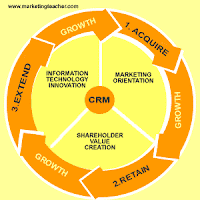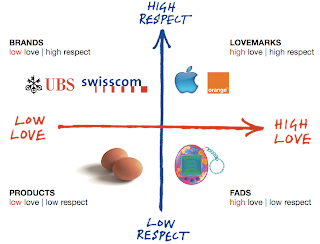Customizing your Real Message & Finding a CRM Voice?
As I mentioned in the prior post, I believe that the consumer world is in the midst of a true paradigm shift. In these dire economic times, there is a huge likelihood that the ongoing increase in the share of time and mind of the Internet is going to accelerate. The consumer will turn to the Internet even more because it offers useful new tools and services that cater specifically to the needs of people living in harder times. (Read here for more about why the crisis will push up Internet use).
The question now becomes how brands and companies want to take advantage of this. What posture will companies take to reach out to the consumer who is decidedly cautious, if not nervous about his or her future? The company that speaks to me in a way that makes sense is a good starting point. For example, if a company (ex Harrods) checks out my doppler and see that I am going to travel to London on such and such a date, then drops me a pertinent offer for that date, would that not be a great idea? The chances are that I would be more than willing to view their mail (if they only they could make their creative a little more classy, too).

There has been much written about CRM (for basics, see marketingteacher.com), as in Customer Relationship Management. But, except for a couple of rare exceptions, I as a consumer have not been “feeling the love” from any particular brand or companies. It is not like I am not present on the Internet, or do not own any loyalty cards, or do not shop frequently at certain stores. There is certainly plenty of data on me out there to mine. At this point, for most companies, the mining has been, at best, superficial. There are some companies who have cottoned on to the idea of email campaigns as a cheap way to bolster traffic — to the web site if not the store. But that’s about it. But, I am looking for more. Companies need to tap into the data (which I volunteer) and capture my attention by knowing more about who I am.
Once companies have mastered dynamic customer knowledge (i.e. created a way to keep an up to date database), the question will then become to what extent (quantity and quality) the brand is communicating with its customers? There is a real risk that a deluge of irrelevant email campaigns will completely shut down the effectiveness of the email channel — broadening the definition of spam, increasing people’s intolerance to emails and making them opt out systematically or just delete with increasing revulsion on reception. If the average rate of opening an email drops down below the 2% level — a barometer for so many formerly traditional media campaigns — you may end up pissing more customers off in the process. While companies are still saving on the postal cost and on the CO2 with emails, they will be shooting themselves in the foot if they overdo it.
There is a golden opportunity to use the ‘net as a marketing tool. There are two important points. First, don’t abuse the opportunity out of laziness. Pouring out unpersonalized, non-customized emails is not the right answer; like cutting down rainforests, it is a very short-sighted approach. Second, mind the data (think “Mind the Gap” as they say in London’s tube stations). What is needed is to craft meaningful messages (in line with the brand’s values), with a customization that reflects some of the unique elements of the receiver.
This all leads me to the main point: Brands endeavouring on CRM programs need to reflect carefully to find their CRM VOICE. There are three core ingredients to creating a CRM Voice. (1) A CRM Voice first means being getting in touch with the brand’s DNA, its core values. How is each communication refurbishing the identity of the brand and reinforcing the customer’s affinity with the brand. (2) It means knowing how to create messages that are relevant to the brand and to the receiving client. Does the brand have an interest in me? Does it know me (without the overtones of Big Brother). Does it know how to surprise me? To wow me? (3) Finally, it means getting the frequency right, knowing how often that person needs or wants to be contacted — including all the different channels of communication (TV included). A well-adapted, customized message becomes part of a well-oiled service.

In summary, brands need to find their CRM Voice: a Customized Real Message that is aligned with the brand’s core values. Brands that are high in love (lovemarks *****) and respect have a potentially greater starting point. But, every customer is looking for meaning and, in today’s difficult economic times, they will be more than likely spending more time online. I will be keen to see which brands or companies come through this vortex smelling like roses — for the times they are a changing, and I believe a paradigm shift is well underway. Which companies are going to capitalize intelligently on the accelerated shift in time on online that is bound to accompany this worldwide crisis? If you do what you always did, you may no longer get what you always got.











Very interesting. As a recent brand newsletter junky I too have yet to find a brand that shows me the love. So far its been secret sale madness only. I still think the best and simplest CRM (not sure if it falls into that category) is amazons ‘those who purchased… also purchased…’ with so much being offered having someone I trust or getting in-touch with other like-minded consumers to help me sift through has been my most appreciated and sought out feature.
Minter,
All sounds good but the easiest part of CRM I find is the name (three short letters easy to pronounce and remember). As for implementing CRM I can only say our experience has been a night mare. First is choosing the right system. Second is finding teh right partner to help develop or customise it. third is trying to get it implemented. Fourth is manging its integration with other proprietary software and your Content Management System. Our experience out there is that most people implementing CRM (on the supplier side) have little expertise in translating the clients’ needs into effective CRM unless they are huge companies, with lots of money and tonnes of time. What about small companies, with fast changing requirements, and relatively lean budgets?
I absolutely agree with teh matching of CRM to digital marketing. The issue is implementation and even finding the right people (without always using expensive outside help to try and do this internally in what is a cutting edge environment. The other issue is measurement. Greta to get all teh thinking right on teh mission side but you need an effective means of measuring returns and not all suppliers of digitla channels (other than Google) understand this.
Great article, Companies spend so much time and effort to attract new customers, if they invested the same effort in retaining them, life would be so much easier . Try BT(British Telecom) Phone up with a problem you get bounced around for ages …press 1 for no reason ,press to cut you off, press 3 to bang your head against a brick wall . Phone to open an account –straight to a human being who is only too happy to sign you up … Thanks Stephen
Great article. This comment isn’t specifically on CRM, but it is on the most powerful database in the world, Facebook. How will Facebook make money off all that information we share with them? Every day millions of people share their most intimate details, favorite movies, actors, products, demographic, psychographics, marital status and even pet names! It is a goldmine but Facebook still hasn’t figured out how to use it. There is a great article in this month’s US GQ that explores this a little more.
The link is below:
http://men.style.com/gq/features/landing?id=content_7640
I definitely agree on the snapshot of what is CRM at the moment with eMarketing overpressure. The fact is that some companies have been told that CRM is a way to stretch the value of the client rather than providing customers with a better brand experience when you get to know them.
In my personal experience, CRM from airline companies have been a good surprise. I do not know if you fly BA, but service over there has been nothing but good as soon as you’re part of the FFProgram: better customer service, cool online experience.
I think it’s a little bit too early for them to use things as Dopplr (especially considering the size of the company hence lack of flexibility) but I’m pretty sure that clever marketers will follow the examples of Zappos (customer service through Twitter) and others.
However, I’m not sure I agree with your conclusion: “Brands must find their CRM voice”. To me the brand is nothing but what customers feel about it. Without consumer feedback, negative or positive, feelings, WoM – there would be no brand. So I think my starting point in defining any CRM project would be: what are customers expecting from me as a brand. And too bad if this is something the marketing finds it not to be in the brand DNA. I think that initiatives like Dell Ideastorm or MyStarbucksIdea are among the greatest examples of getting customer insights in a 2.0 fashion. Starts from there and build better customer experience. As for your Dopplr example, it’s definitely a good idea but again a need that you expressed.
@Kathy: Yes Amazon innovated and paved the way…
@Ivan: totally agree with you that implementation and finding the right partner is much more complicated. Understanding the cost is one thing, but getting the company’s resources behind a true CRM approach can also involve change management (depending on the size and culture of the company of course).
@Steve: The Human Touch still has its place, big time. Getting the call center solution right is, for me, a strategic issue. Centralising specific consumer information and good IT systems for tracking the calls, delegating enough authority, training… Each human contact is a gold mine…
@Vivianna: FB has a lot to figure out still!
@Tony: Your points are supremely valid. I am a huge advocate of the BRAND in the larger sense of the word … as opposed as to the collection of products that seems to be the focus of too many marketers. And, yes, the nature of the value of a brand’s equity lies in the eyes and hearts of the consumer. The voice to which I refer is really the voice that best suits the consumers’ understanding and relationship with that brand… it is THIS equilibrium and VOICE that brand marketers need to figure out.